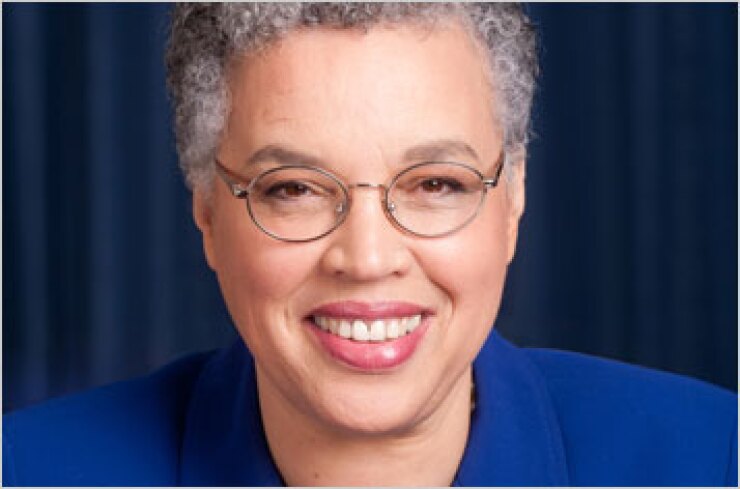
CHICAGO — The Cook County, Ill. board of commissioners Wednesday approved a controversial sales tax increase to fund the county's pensions.
The vote came after hours of public comment and debate. County President Toni Preckwinkle, who proposed the tax hike, called the special board meeting after weeks of lobbying the board's 17 commissioners for their support.
The board voted 9 to 7 to boost the sales tax to 1.75% from 0.75%, with one commissioner voting present.
The board also approved a resolution that signaled intent to use the new money for pensions and debt service.
"This was surely a difficult session," Preckwinkle said after the vote. "I want to especially thank those who had the foresight and courage to vote for these measures."
Cook, which is home to Chicago, is the third largest county in the country. The tax hike will push the overall sales tax rate to 10.25% from 9.25%, giving Chicago the highest sales tax rate in the country.
Preckwinkle proposed the tax despite winning the executive seat in 2010 by campaigning against a one-cent sales-tax increase implemented by then-President John Stroger. After winning office, Preckwinkle implemented a gradual rollback of the tax. Two years after the final rollback, Preckwinkle now says the county faces downgrades, chronic budget shortfalls and even insolvency without the new money.
The bulk of the revenue, estimated at $474 million a year, would go to the county's unfunded pensions. Another piece of it would go to cover a jump in debt-service, which is expected to rise to $251 million in 2016, from $187 million in recent years.
The new money would also indirectly fund infrastructure projects, as the county would stop diverting a piece of the motor fuel tax to the county's court system and instead dedicate it solely to highway infrastructure projects.
The board voted 9 to 7 in favor of the tax after nearly two hours of public testimony and an hour of committee debate.
Union representatives, local pastors, and county retirees generally spoke in favor of the tax increase, while business owners, the Chicagoland Chamber of Commerce, the Illinois Retail Merchants Association and fiscal watchdog group the Civic Federation of Chicago urged a no vote.
Like other critics, the Civic Fed said the board should hold off on the new tax until Preckwinkle has presented a 2016 budget and the county has considered all other options. "All of us are frustrated by what's going on in Springfield, but that does not justify and does not mandate that you go forward on a sales tax increase," Civic Federation head Laurence Msall said during his public testimony.
The legality of the move is uncertain, as the government is currently restricted to tapping its property taxes for the retirement obligations, said Msall.
"There's real legal questions about whether you can even do it," he said. "The Civic Federation urges you to put your budget together for 2016 so we can everything that has been done to justify the tax increase, rather than just being told."
The county has received conflicting legal opinions on whether it can use the new revenue for the pensions.
Current state law restricts the county to funding its pensions with property taxes, and also caps the amount of money the county can contribute to its fund. A separate pension reform package crafted by the board and Preckwinkle would would lift both of those restrictions. The state Legislature needs to approve the package, and has twice failed to do so.
Commissioner Bridget Gainer, D-Chicago, the chair of the county's pension committee, voted against the increase, saying the new money wouldn't solve the pension problems.
"We have a bill that is sustainable and it needs to be passed by Springfield," Gainer said, one of the chief architects of the reform legislation. "Once we raise this tax and extract another half a billion out of the taxpayers, we're going to release the pressure on Springfield and not remain on that priority list," she said. "The pension can't survive even with this tax without that reform."
In addition to the legal questions, commissioners opposed to the tax also said the tax would hurt the poor and local businesses.
Supporters said the tax hike is necessary to stabilize the county's finances. "Today is about honoring the commitments made to our employees," said Commissioner John Daley, D-Chicago and chair of the finance committee. "No one can argue with a straight face that this government hasn't been reformed under President Toni Preckwinkle."
The new tax would raise $474 million. Nearly all of the new money — 90% in the first year — would go to the county's pensions, which have a $6.5 billion unfunded liability. That would later come down to 70%.
Cook also faces an estimated $480 million budget gap heading into fiscal 2016, according to the Preckwinkle's office. The county's fiscal year begins in December. She plans to cut $100 million in spending in her new 2016 budget, which she has not yet unveiled.
If lawmakers decide to pass the legislation by the end of the summer, Preckwinkle said she would reconsider the tax. An amendment that would have required a rollback failed to pass.
The county board needed to approve the tax by the end of September to start collecting it in January.





